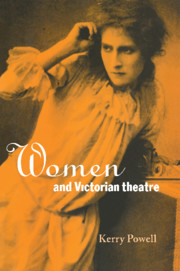3 - Actresses, managers, and feminized theatre
Published online by Cambridge University Press: 06 November 2009
Summary
No woman has ever won reputation in this profession.
(From a memoir on Sara Lane, long-time manager of the Britannia Theatre, arguing for women's unfitness to be theatre managers.)For the majority of actresses, survival rather than respectability was the main concern, and their precarious careers were at the mercy of the actor-managers who selected plays for production and cast them according to their own prejudices and interests. “Twice in the course of my life on tour,” recalls Cicely Hamilton, “I was thrown out of work to make room for a manager's mistress; no fault was found with the playing of my part, but it was wanted for other than professional reasons, and therefore I had to go.” In a letter to the Era, actress Charlotte Morland lamented that too often for a woman in her profession “success or failure are consequent on her powers of fascinating the one man who has her career in his iron grasp, and who can make or mar her according as she yields or resists to his will and pleasure.” Despite a growing emphasis on the respectability of Victorian actresses, couch politics could still make or break their careers, and sexual attractiveness to men was almost essential to success.
Although heroes in late Victorian drama might be any age, recalls the actress-manager Lena Ashwell, all the heroines had to be young and lovely. Ashwell herself was discouraged from going on the stage by George Alexander, actor-manager at the St. James's Theatre, “as it was necessary for such a career to be beautiful, or at any rate good-looking, and…I was very plain.”
- Type
- Chapter
- Information
- Women and Victorian Theatre , pp. 64 - 74Publisher: Cambridge University PressPrint publication year: 1997



